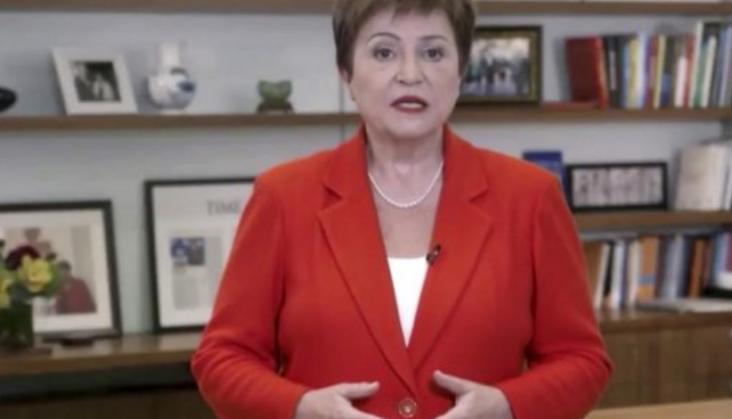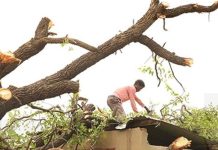Africa-Press – Botswana. Kristalina Georgieva, managing director of the International Monetary Fund, feels that this war, which comes at a time of post-Covid-19 recovery, will not only “devastate millions of lives” but also “threaten to wipe out some” of the progress made on the continent.
International Monetary Fund (IMF) Managing Director Kristalina Georgieva speaks at a virtual event hosted by the London School of Economics ahead of the IMF and World Bank Group annual meetings in Washington, D.C., US, 6 October 2020. © Liu Jie/XINHUA-REA
Kristalina Georgieva, managing director of the International Monetary Fund, feels that this war, which comes at a time of post-Covid-19 recovery, will not only “devastate millions of lives” but also “threaten to wipe out some” of the progress made on the continent.
In a message sent on 10 March, Kristalina Georgieva spoke about the consequences that Russia’s invasion of Ukraine will have on African economies. “Africa is particularly vulnerable to the impacts of the war in Ukraine through four main channels: higher food and fuel prices, lower revenues from tourism, and potentially more difficulties in accessing international capital markets,” said the IMF managing director after a meeting on 9 March with African finance ministers, African central bank governors, and representatives from the UN Economic Commission for Africa (UNECA).
“The war in Ukraine is devastating the lives of millions of people and severely affecting the Ukrainian economy. The war and the unprecedented sanctions imposed on Russia have far-reaching consequences. They come at a delicate time for Africa,” she added.
Threat to progress
Georgieva lamented that while the global economy and the continent “are beginning to recover from the ravages of the Covid-19 pandemic, this new crisis threatens to undo some of that progress.” However, she said she was “very encouraged by African policymakers’ strong interest to continue our dialogue on policy responses.”
“I noted, in particular, the significant concerns regarding the limited domestic policy space to address the ongoing crises in a sustainable manner,” she said, implying in IMF terminology that the Fund is prepared to be flexible when it comes to strictly complying with the reforms demanded in exchange for financial support.
Some of these, in particular removing general subsidies on energy products, are proving difficult to achieve. Meanwhile, the price of crude oil rose by more than $30 a barrel between the day before Russian forces entered Ukraine and early March. At over $113 a barrel, crude oil is now at its highest level since before the 2008 financial crisis.
“During this difficult time, the Fund stands ready to help African countries cope with the impact of war and to design and implement reforms through policy advice, capacity development and lending. Recent reforms to the Fund’s lending toolkit provide greater flexibility to help meet financing needs,” concluded the IMF boss.
An unforeseen conflict
In the latest update of the IMF’s World Economic Outlook, dated January 2022, the possibility of a crisis on the European continent was not envisaged and the word Ukraine does not appear anywhere. However, the report did point out that “rising food prices have contributed to rising inflation, for example in sub-Saharan Africa.”
The multilateral institution nevertheless expected the economy to recover, with an estimated 4% increase in GDP for the year 2020 south of the Sahara, after a 1.7% decline in 2020. The Fund anticipated growth in 2022 and 2023 of 3.7% and 4% respectively, a very slight decline (-0.1 percentage points in both cases) compared to the October 2021 forecast.
It is worth noting that the Fund approved disbursing $1.4bn to Ukraine “to address urgent financing needs and mitigate the economic impact of the war” on 9 March.
For More News And Analysis About Botswana Follow Africa-Press






